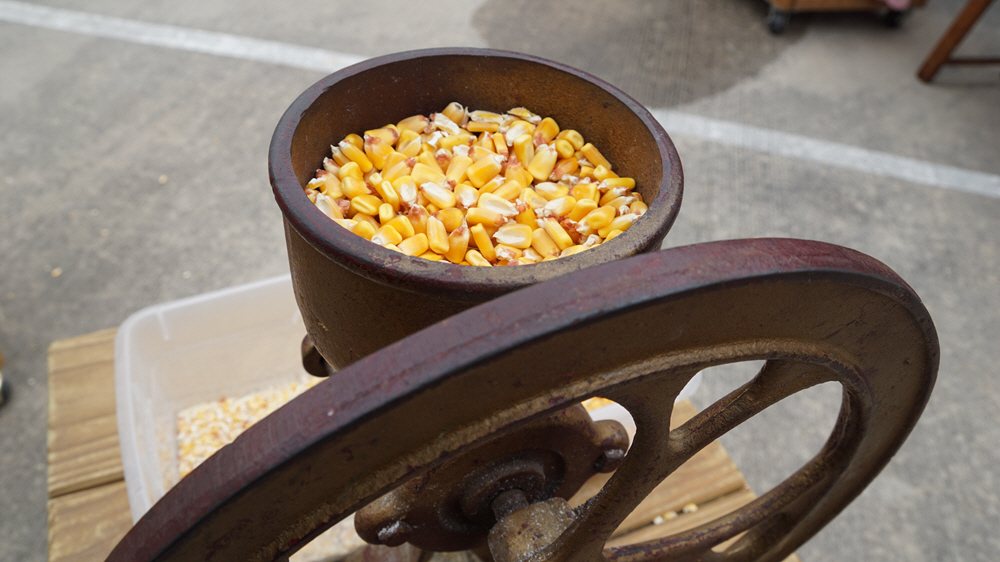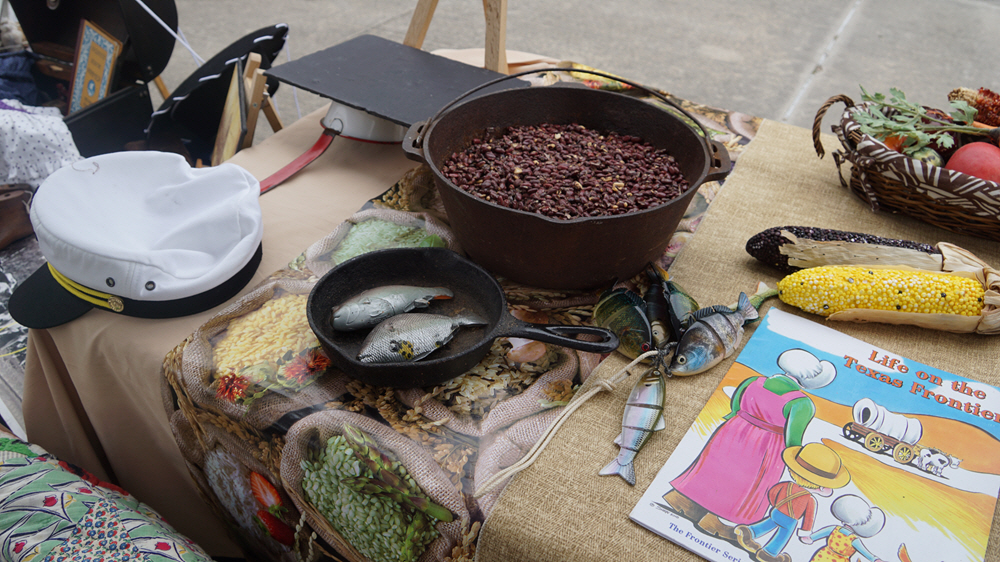Assembly Programs
Learning from our past to influence our future.
The LEARNING FROM OUR PAST TO INFLUENCE OUR FUTURE program – created and developed by SaveWaterTexas.com — helps educate youngsters about critical past, current and future water issues by emphasizing how the history of Texas has always been tied to water. Much of the arid region of Texas, for example, could not have been populated without access to water.
Simply stated, if students understand how critical water was to life on the frontier, they will develop a greater appreciation for how much we still rely on a sustainable supply of water today and into the future. The goal is to help them avoid wasteful habits as youngsters, and to encourage them to make a life-long commitment to becoming stewards of this finite natural resource as adult water users with families of their own. They will be the ones making crucial decisions as future population growth collides with available water resources and their preparation for that challenge should begin today. If youngsters grow up with a better comprehension about water as a global issue – and how important it is to “spend” it wisely — they will make more informed decisions in the future.
While many are puzzled by the ‘connection’ between Texas History and water conservation, this unlikely pairing has resonated with students, teachers and parents who have come into contact with the program. Educators say that the cross-disciplinary “Learning from our Past” imparts an appreciation for something ‘larger than themselves’ to the students, helping them to realize the role they will play in the future.
Life on the Texas Frontier
The SaveWaterTexas.com team of experienced educators transports students back in time to learn about how virtually everything settlers did depended on access to water.
Life on the Texas Frontier, the second grade assembly, features an extensive collection of “antiques” that were used by frontier families to build and maintain their homes, for growing and preparing their food, to make clothes, and the equipment they used to obtain and use water. The students each receive a copy of a coloring book along with related activity sheets.
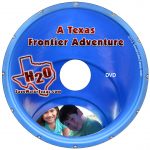 A related video, “A FRONTIER ADVENTURE” – “starring” local elementary school students — “transports” the youngsters back into time through a visit to a frontier village where they encounter a family who explains how they lived and relied on water to survive. A FREE copy of this DVD is given to the teachers for follow-up classroom viewing.
A related video, “A FRONTIER ADVENTURE” – “starring” local elementary school students — “transports” the youngsters back into time through a visit to a frontier village where they encounter a family who explains how they lived and relied on water to survive. A FREE copy of this DVD is given to the teachers for follow-up classroom viewing.
How Windmills and Barbed Wire Helped Win the West
This program is first-class “edu-tainment” featuring a series of historical “cameos”, numerous display ‘stations’, some hands-on learning activities, and take-away materials to punctuate the experience. The program begins by chronicling the settlement of Texas and the six flags that flew over the state.
WINDMILLS AND BARBED WIRE takes 4th graders back to one of the most exciting periods in Texas history – the cattle drives and confrontations with the Plains Indians. While it is logical – if one stops to think about it – that the entire westward movement was dictated by the availability of water, this classroom resource points out just how critical water was to the cowboy and rancher…and how they accommodated the changes brought about by the invention of barbed wire. During the mid-19th century, men left their families back on the Texas frontier to fight in the U.S, Civil War. While they were away, the women were left to maintain the farms and livestock and protect their homesteads from bands of marauding Indians and other attacks. They persevered and survived, raising families of strong, independent children who subsequently grew into adulthood and became the state’s leaders. Before the arrival of the explorers or the settlers, the Native Americans were equally dependent upon water for survival, as well. These experiences set the stage for the emergence of the legendary State of Texas.
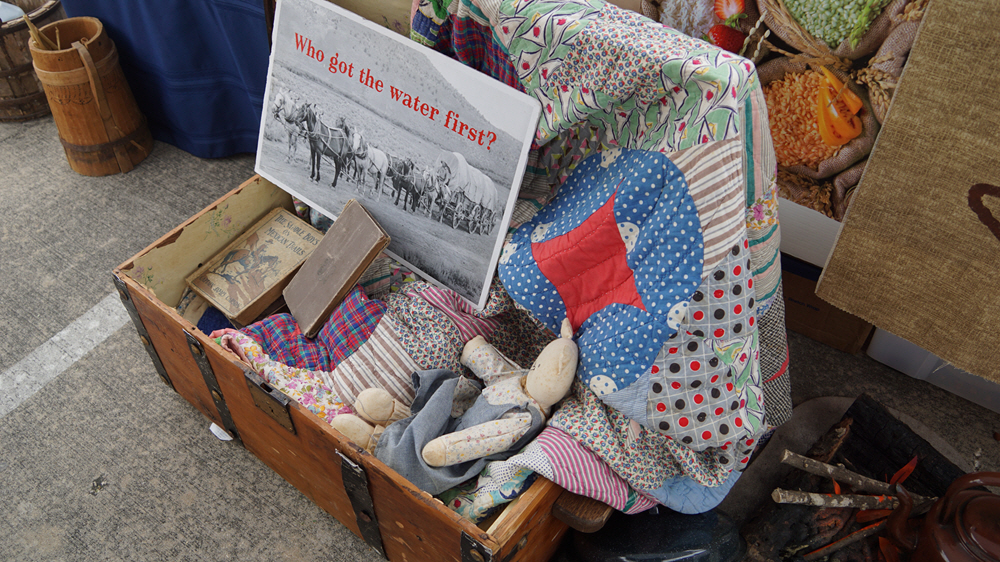
One of the things that make these Assembly programs unique is that the highlighted historical events are inextricably tied to the availability of WATER in frontier Texas. The critical connections are identified, explained, and linked to the importance of preserving and protecting our finite water resources a century later.
Click here to contact us for more information about scheduling these programs.
2nd & 4th Grade Assembly Edu-Tainers

Prairie Mary
My family and I came to Texas in 1850 from Kentucky. Life was hard getting to Texas; I pretty much walked by the wagon all the way because our belongings took up almost all the space inside. We settled in West Texas where our family grew to include four wonderful boys. Everyone did their part starting at a young age. The boys helped work in the fields and hauled water. My husband met Charlie Goodnight and soon joined his trail rides. The famous rancher hired him as the “cook” and he made good money for the family doing that. Our two oldest boys would sometimes go on trail rides with him, but that left me at home with the young’ns to keep the farm going. I survived but was always happy to see my menfolk come home after being gone for months. I had to face the challenge of surviving back home by playing many roles – mother, homemaker, teacher, gardener, doctor, and seamstress to name just a few.
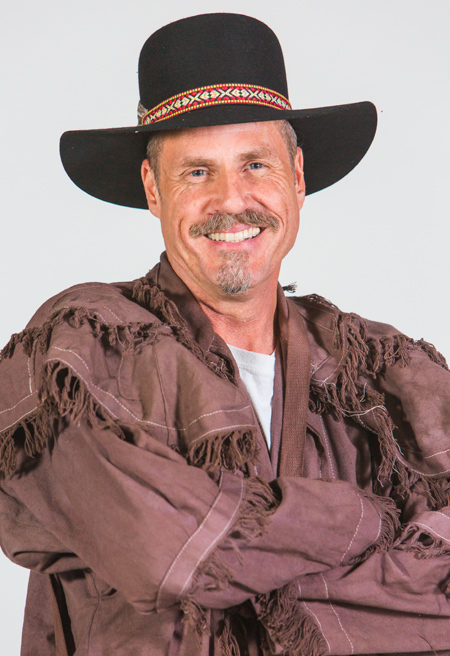
Trapper Zeke
I traveled from the Pacific Northwest, through the Rocky Mountain states, and down into Texas working as a frontier fur trapper. Some people call me a mountain man, as I pursue my quarry into the furthest reaches of wilderness along rivers and streams while living off the land. There were never more than one or two thousand of the so-called Mountain Men, and their heyday only lasted about 20 years. We did, however leave an indelible mark on American history as we ventured into the Rockies and southwest. By the 1840’s, the fur trade – especially beaver pelts –was one of the forerunners of US industry. Women wore beaver hats, collars and coats, and virtually every man sported a hat made of the animal. In sharing his story, Zeke teaches kids about natural resources and water conservation.
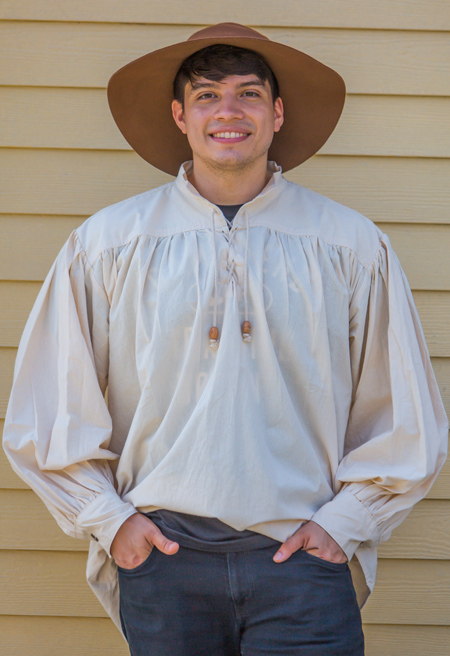
Frontier Settler:
I take pride in being a jack of all trades. There’s a lot of work to do on the farm, so I try to learn as much as I can to help my family prosper. I especially love learning about science and topics like natural resources, simple machines, and agriculture. I try to focus on things to better our everyday life. Yesterday, I helped my mom tend to the crops. It sounds easy enough, but carrying water from the river is pretty heavy and time consuming. After a few hundred trips you’ll surely be ready to throw in the towel. I also spent some time with my uncle Howie; he’s teaching me the ins and outs of blacksmithing. We’ll have to forge tools like axes, hammers, and chisels for building our homestead and new community. There’s much to do around here. I’d better get to work!




